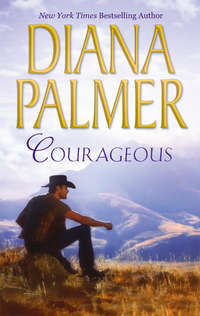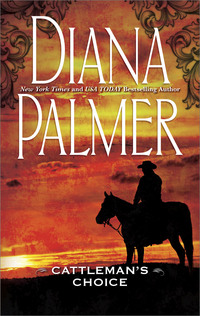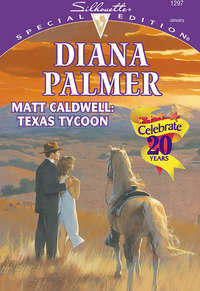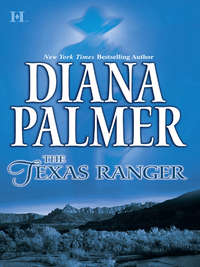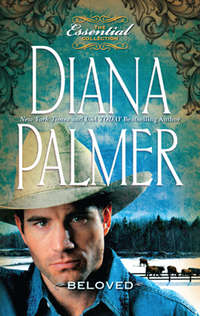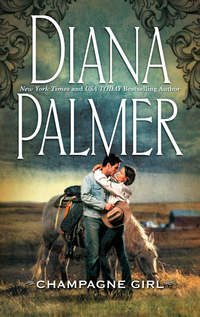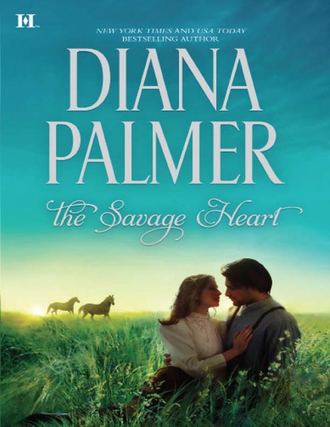
Полная версия
The Savage Heart

New York Times and USA TODAY bestselling author DIANA PALMER presents a classic romance about a woman with big dreams and a man who has nothing left to believe in...except her
Tess Meredith and Raven Following grew up on the beautiful, wild Montana plains. But their friendship and love were doomed by Raven’s Sioux heritage…and his departure from the land of his people. In Chicago, he built a new life, haunted by thoughts of the lovely, spirited young girl he’d left behind. Until she arrived back in his world--bringing with her the past he’d tried to bury. But Tess had changed, too. She’d matured into a woman, and was determined to fight for her rights in society-and for the love of a man who felt he was savage at heart….
Praise for the novels of New York Times and USA TODAY bestselling author Diana Palmer
“Palmer demonstrates, yet again, why she’s the queen of desperado quests for justice and true love.”
—Publishers Weekly on Dangerous
“The popular Palmer has penned another winning novel, a perfect blend of romance and suspense.”
—Booklist on Lawman
“Palmer knows how to make the sparks fly…heartwarming.”
—Publishers Weekly on Renegade
“Sensual and suspenseful.”
—Booklist on Lawless
“Diana Palmer is a mesmerizing storyteller who captures the essence of what a romance should be.”
—Affaire de Coeur
“Nobody tops Diana Palmer when it comes to delivering pure, undiluted romance. I love her stories.”
—New York Times bestselling author Jayne Ann Krentz
The Savage Heart
Diana Palmer

www.millsandboon.co.uk
To Dr. Nestor R. Carabjal, Dr. Winston H. Gandy, Dr. F. Stuart Sanders, Dr. David A. Bray and Dr. Michael J. Maloney. Thank you all, most sincerely.
—Mrs. James E. Kyle (AKA Diana Palmer)
Contents
Prologue
Chapter One
Chapter Two
Chapter Three
Chapter Four
Chapter Five
Chapter Six
Chapter Seven
Chapter Eight
Chapter Nine
Chapter Ten
Chapter Eleven
Chapter Twelve
Chapter Thirteen
Chapter Fourteen
Chapter Fifteen
Epilogue
Prologue
Montana Spring 1891
There was lightning in the distance where dark clouds settled low over the buttes. Spring storms, all lightning display at first, were common here, and Tess Meredith loved to watch them—especially now that she had a companion who seemed to have a legend about every one of these natural occurrences…and every unnatural one, too.
But even more than watching summer storms with her new and treasured friend, Tess liked to ride fast, hunt and fish, live in the outdoors enjoying nature and what she called “adventure.” Her father despaired of her ever marrying. Who would appreciate a young woman who had such accomplishments, not one of which had anything to do with traditional domestic occupations?
Today Tess looked quite different from the way she usually did and quite grown-up for a fourteen-year-old. Her blond hair was piled neatly on top of her head, rather than flying free; she was wearing a long cotton dress with a high neck, rather than rolled-up dungarees and one of her father’s shirts. Polished lace-up shoes replaced the scuffed boots she always wore. Her father had beamed when he’d seen her earlier. Of course, he wouldn’t say a chastising word to her on the subject of her dress or her unladylike pursuits. He was far too kind to do such a thing. It was the kindness in him, so deep and so sincere, that made him such a wonderful doctor, Tess believed, for many who practiced medicine had skill, but few had his way with patients.
She sighed and glanced over at Raven Following, the only man she’d ever known who treated her as an equal, not a silly child—or worse, a silly girl. He was a Sioux who had lived at Pine Ridge until about eight months ago. His shoulders, wide and powerful, did not move under the buckskins he wore. His long, thick black hair was braided and wrapped with narrow bands of ermine skins, and his strongly boned, handsome face was free of expression.
Looking at him, Tess was filled with melancholy and curiosity. What did Raven see? For he seemed to see all manner of things around and in the far distance that she couldn’t. Sometimes it was difficult for her to believe he was only six or seven years older than she.
“Are you scared?” she suddenly asked.
“A warrior never admits fear.”
She smiled. “Oh, pardon me. Are you nervous, then?”
“Uneasy.” His lean, graceful fingers held a stick that he alternately toyed with and used to draw symbols on the ground. Now he was idly moving it from hand to hand. “Chicago is far away from here. I’ve never been to a white man’s city.”
“Papa says you’ll be educated there and afterward you can get a job. He knows a man who will give you work.”
“So he has told me.”
She touched his shoulder lightly. He didn’t like to be touched, not since he’d been so badly wounded in the massacre at Wounded Knee Creek, South Dakota, where the fury of the Hotchkiss guns of the soldiers had taken the lives of more than two hundred of his people, including his mother and two sisters. But Tess’s touch was different, and, she thought, tolerable to him, since she’d help nurse him through the agonizing recovery from having his body riddled with U.S. Army issue bullets.
“It will be all right,” Tess said, her voice gentle and, she hoped, reassuring. “You’ll like Chicago when you get there.”
“You are so very sure of that?” His black eyes were glittering with humor.
“Of course! After Mama died and Papa told me he was going to take a job doctoring on the reservations, I was scared to death. I didn’t know anybody out here, and I had to leave all my friends and relatives behind. But once I got to the West, it wasn’t bad at all.” She rearranged her skirt. “Well, it wasn’t too bad,” she amended. “I didn’t like the way the soldiers treated your people.”
“Neither did we,” he said dryly. He paused, studying her, finally looking intently into her clear green eyes. “Your father will be relieved when I am gone. He permits me to teach you things, but he grimaces when he sees you doing them.”
“He’s old-fashioned.” Tess laughed. “And the world is changing.” She looked at the distant buttes. “I want to help it change. I want to do things that women have never done.”
“You already do things that few white women do—skin a deer, track a doe, ride without a saddle, shoot a bow—”
“And sign and speak Lakota. All thanks to you, Raven. You’re a good friend and a good teacher. How I wish I could go to Chicago with you. Wouldn’t we have fun?”
He shrugged and began to draw symbols in the dust at his feet.
How graceful his hands were, Tess mused. His fingers were strong, yet lean, and his wrists were so finely boned, they appeared delicate beneath the long corded muscle of his forearm. He leaned forward, and her gaze traveled over his back. Tess winced. Beneath the buckskin shirt his flesh was puckered and pocked with scars, scars that would be there always to remind him of Wounded Knee.
It was a miracle, Tess’s father, Harold, had said, that Raven has survived. Half a dozen bullets had torn into his upper back; one had punctured his lung, causing it to collapse. And that was not the worst of his injuries. Harold Meredith had done everything his medical training had taught him and then some to save Raven’s life, but at last he’d sought the help of a practitioner from a tradition far different from his own: he smuggled a Lakota shaman into Raven’s bedchamber.
Whether it was Harold’s or the shaman’s skill—or the skills of both—they would never know. But soon the Great Spirit smiled, and Raven began to recover. It was a long and painful journey back to health, and through it all Tess was at Raven’s side.
“Will you miss me?” she asked.
“Of course,” he said, smiling easily. “You saved my life.”
“No. Papa and your shaman did that.”
Raven Following was not a demonstrative man, but now he took her small, white hand in his large, dark one and held it. “You did it,” he said firmly. “You saved my life. I lived only because you cried so hard for me. I felt sorry for you and knew I could not be so rude and thoughtless as to disappoint your hopes by dying.”
She chuckled. “That’s the longest sentence I’ve ever heard from you, Raven—and the only one the least bit deceitful.” Her eyes sparkled.
He stood up, stretched lazily, then pulled her up beside him. His gaze slid over her flushed face. She was almost a woman, and she was going to be very pretty, perhaps beautiful. But she worried him. She felt things so deeply…with such strong emotion.
“Why?” she asked suddenly. “Why, why?”
He did not need to ask where her thoughts had carried her. Without hesitation, he said, “Because of what the Lakota did to Custer, I think. I have reflected on Wounded Knee for several months now, Tess. Some of the soldiers who opened fire on us, on the children—” his body stiffened for a moment as if he might be hearing once again the wails of terror and screams of pain from those children “—some of those soldiers,” he went on, “were from Custer’s surviving companies.” He looked at her intently. “I was six when we fought Custer, and I remember how the soldiers looked there, on the battlefield. Many of the women had lost sons and fathers and husbands to those men. My own father died there. The women took out their grief on the bodies of the dead soldiers on the Greasy Grass. It was bad.”
“I see.”
“No. And it is good that you don’t,” he replied, his face curiously taut. “I teased you before, Tess, but truly I would not have lived if you and your father had not been so brave…and so swift.”
“We left for the battlefield the instant we heard there had been fighting and that many were dying on that frozen ground.” Tess shivered and tears filled her eyes. “Oh, Raven, it was so cold, so bitterly cold. I shall never forget it, and I thank God we found you.”
“As I thank the Great Spirit that you and your father rescued me and tended my wounds and hid me in your wagon until we were out of South Dakota.”
“Lucky that Dad was being transferred to the Northern Cheyenne Reservation. It was easy to pretend we’d found you on the roadside in Montana near Lame Deer. No one ever questioned our story—well, not to our faces anyway.”
He smiled. “I was not so lucky in my decision to visit my cousins in Big Foot’s band, though, was I?”
She shook her head. “You could have been safe in your lodge in Pine Ridge….”
“And my mother and sisters, too.” His voice had trailed off. Now, suddenly, he shook off his enveloping grief. “Come,” he said, “let us go back. Your father will be wondering where you are.”
She started to protest, but his gaze was even and quiet, and she knew that it would be like talking to a rock. She gave in with good grace and smiled at him.
“Will we ever see you again after you go?” she asked.
“Of course. I’ll come back and visit from time to time,” he promised. “Don’t forget the things I’ve taught you.”
“As if I could,” she replied. She searched his black eyes. “Why do things have to change?”
“Because they do.” In the distance, the sky became misty as the threatening clouds released a curtain of rain.
“Come. The rain will overtake us if we don’t hurry.”
“One more minute, Raven. Please, tell me something.”
“Anything,” he murmured.
“What did Old Man Deer do when we sat up here with him last week?”
Raven’s body stiffened slightly and he glanced away. “He performed a ritual. A very sacred one.” He looked fully at Tess. “It was a way of protecting you,” he said enigmatically. Then he smiled. “And we will say no more about it now.”
Chapter One
Chicago, Illinois November 1903
The telegram read: “Arriving Chicago depot 2:00 p.m. Saturday. Tess.”
Matt Davis had read the telegram several times and cursed it several times more. Tess Meredith had no business moving to Chicago. Her father had died only two months ago. Matt hadn’t got the news until long after the funeral was over when he returned from working in another state. He’d written Tess right away, of course, and she’d written back. But she’d never so much as hinted that she had this in mind.
He’d visited Tess and her father many times and kept up a regular correspondence with them all through the years after he’d gone east to be educated, then changed his name to begin work as a Pinkerton detective. Raven Following had become Matt Davis and had changed in a hundred other ways, too, but never in his regard for Tess and Harold Meredith. They were all the family he could claim. And he’d looked forward to each visit with them more than anyone would ever know.
Tess at sixteen hadn’t been quite so outgoing as she had been two years before. She’d become somewhat shy, remote. Tess at eighteen had been a very different proposition. Mature, pretty—and more reckless than he remembered. Last year, he’d made another pilgrimage to Montana, which he combined with work on a case for his own new private detective agency, and the sight of a grown-up Tess of twenty-four had shocked him speechless. No longer the grinning fourteen-year-old sprite, no longer the shy sixteen-year-old or the reckless eighteen-year-old, Tess was mischievous, forceful, outspoken—and so beautiful that she made him ache. And she was driving her father wild. He’d confessed to Matt that she wouldn’t even allow talk of marriage…that she’d ridden her horse through town wearing pants and a shirt and carrying a sidearm…that she’d organized a women’s suffrage group in town…and that she’d actually attacked a local man with a pistol when he tried to get fresh with her. The aging doctor had asked Matt for advice. But, confronted by this new and challenging Tess, Matt, too, had been at a loss.
Now her father was dead and he was inheriting Tess, a legacy of feminine trouble he knew was going to change his life. It was a worrying and exciting proposition.
The train pulled into the station, huffing and puffing clouds of smoke. Wary of the cast-off cinders from the engine, elegantly dressed men and women began to disembark, porters came and went unloading baggage, but there was no sign of Tess.
Matt sighed irritably as he stared around the platform. Suddenly, a shapely woman clad in natty green velvet, wearing a Paris creation of a hat with a veil, and impatiently tapping a prettily shod foot, ceased to be a stranger to him. The years fell away and the elegant woman was again the girl with long blond pigtails he’d known so long.
At that very moment Tess spied him. All her elegant poise vanished, and she raced across the platform shouting his name, then hurled herself at him.
His arms swallowed her and he lifted her high, laughing as his dark eyes met her green, green ones through the misty veil.
“Oh, Matt, I’ve missed you so,” she crooned. “You haven’t changed a bit.”
“You have,” he said, slowly lowering her back to her feet.
“Only because I have breasts now,” she said.
His cheeks went ruddy, he knew, for he could feel the heat in them. “Tess!”
She propped her hands on her hips and stared up at him. “It’s a new world. We women are done with hypocrisy and servitude. We want what men have.”
He couldn’t help it. He grinned. “Hairy chests?”
“Yours isn’t hairy,” she said belligerently. “It’s very smooth.” She looked at him soberly. “Does anybody here know who you really are, where you came from?”
Matt’s brow lifted just enough to make him look arrogant. “It depends on which version of my past you prefer. My banker is convinced I’m exiled Russian royalty. My old Pinkerton buddies believe I came here from Spain. The elderly Chinaman who does my laundry thinks I’m an Arab.”
“I see.”
“No,” he said, his eyes narrowed. “You don’t. You have the right to speak your native language and dress in clothing familiar to your forebears. A Sioux isn’t even allowed to participate in a native religious ceremony, not even the Sun Dance.”
He straightened the tie that so beautifully complemented his elegant vested suit. He wore a derby, his long hair contained in a ponytail that rested under the neck of his shirt. Few people in Chicago knew that he was Sioux. “Let people think what they like about me,” he said, refusing to admit that it disturbed him to reveal his ancestry. “I’m a mystery man, Tess,” he said gleefully. Then he sobered again and added, “Nothing will ever be the same because of Wounded Knee. Now it’s illegal for an Indian at a government school or holding a government job to wear his hair long or dress in native clothing or speak his own language.”
“And,” Tess added morosely, “you can’t even vote in your own country.” She brightened. “Just like me. Well, Mr. Davis-Following, we’re going to have to change all that.”
His onyx eyes regarded her somberly. She was delightfully pretty. But underneath the beauty, there was character and an independent spirit. “I’m sorry about your father,” he said. “I know you must still miss him.”
“Don’t get me started,” she said through stiff lips, glancing around her to stay the tears. “I’ve tried very hard to be brave, all the way here. Even after two months, it’s still very new, being an orphan.” Her small gloved hand went to his waistcoat pocket and rested over it. “Matt, you don’t mind that I came?” she asked abruptly. “I had no one in Montana, and one of the soldiers was pestering me to marry him. I had to get away before I gave in out of sheer exhaustion.”
“The same soldier your father mentioned in his last letter to me, a Lieutenant Smalley?”
“The very one.” She withdrew her hand and twisted the handle of her frilly parasol. “You remember the name very well, don’t you?”
“It’s hard to forget the name of a man who helped kill most of my family at Wounded Knee,” he said harshly.
She looked around them, finding people going their own way. Nobody paid undue attention to them. It would have been a different story back in Montana, where the sight of a young blonde woman with a full-blooded Sioux would have raised more than just eyebrows. Lord, she thought, everyone would have been glaring furiously at them—as they had in the past.
“I remember the way you were,” she said gently. “Dressed as a warrior, on horseback, with your hair flying in the wind and your arrows winging toward the center of a bull’s-eye.” Watching her watch Raven, her father had teased her that she was losing her heart.
Matt didn’t like remembering his past. “I remember you trying to skin a deer and throw up at the same time.”
She held up a hand. “Please, I’m a gentlewoman now.”
“And I’m a detective now. Shall we agree to let the past lie without further mention?”
“If you like.”
“Where are your bags?”
“The porter has them on the cart, there.” She pointed toward a steamer trunk and several smaller bags. She glanced up at him. “I suppose I can’t live with you. Or can I?”
He was shocked. Did she know more about the past than she had ever let on? He held his breath.
“I don’t mean with you,” she said, embarrassed at her own phrasing of the question. “I mean, you live in a boardinghouse, and I wonder if there’s a vacancy?”
He let out his breath and smiled with relief. “I imagine that Mrs. Mulhaney could find a room for you, yes. But the idea of a young single woman living in a boardinghouse is going to make you look like a loose woman in the eyes of the community. If anyone asks, you’re my cousin.”
“I am?”
“You are,” he said firmly. “It’s the only way I can protect you.”
“I don’t need protecting, thank you. I’m quite capable of looking after myself.”
Considering that she’d handled her father’s funeral alone and gotten here, halfway across the country, without mishap, that was apparent.
“I believe you,” he said. “But you’re a stranger here and totally unfamiliar with life in a big city. I’m not.”
“Aren’t we both strangers here, really?” she asked, and there was a deep sadness in her tone. “Neither of us has anybody now.”
“I have cousins in South Dakota and in Montana,” he replied.
“Whom you never visit,” she shot back. “Are you ashamed of them, Matt?”
His eyes glittered like black diamonds. “Don’t presume to invade my privacy,” he said through his teeth. “I’ll gladly do what I can to see you settled here. But my feelings are my own business.”
She grinned at him. “You still strike like a rattler when you’re poked.”
“Be careful that you don’t get bitten.”
She dropped him a curtsy. “I’ll do my best not to provoke you too much.”
“WHAT ARE YOU PLANNING to do here?” Matt asked. He’d arranged with the station agent to have her bags stored until he could settle Tess and send for them.
“I’m going to get a job.”
He stopped dead in his tracks and stared at her. “A job?”
“Certainly, a job. You know I’m not rich, Matt, and besides, it’s 1903. Women are getting into all sorts of professions. I’ve read about it. Women are working as shop girls and stenographers and in sewing plants. I can turn my hand to most anything if I’m shown how. And I’m quite an experienced nurse. Until Papa died—” her voice broke and she took a few seconds to compose herself “—I was his nurse. I can get work nursing in a hospital here. I know I can.” She abruptly looked up at him. “There is a hospital here, isn’t there?”
“Yes.” He remembered making a keen shot of her with both bow and rifle. She was a quick study, and utterly fearless. Had he started her down the road to nonconformity? If he had, he knew in his bones that he was about to regret it. Nursing was not considered by many as suitable for a genteel woman. Some would raise eyebrows. Of course, it would raise eyebrows, too, if she worked in a shop, or—
“The very notion of a woman working is—well, unconventional.”
Her brows rose. “What would you call a Sioux Indian in a bowler hat pretending to be exiled Russian royalty—traditional?”
He made an irritated sound.
“You shouldn’t debate me,” she muttered. “I was first in my class in my last year in school.”
He glared at her as they started to walk again down the broad sidewalk. Exquisite carriages drawn by horses in decorated livery rolled along the wide street, whose storefronts were decorated for the holiday season.
Tess caught sight of a store window where little electric trains ran against a backdrop of mountain scenery that had actual tunnels running through. “Oh, Matt, look. Isn’t it darling?”
“Do you really want me to tell you how I feel about iron horses?”
“Never mind, spoilsport.” She fell into step beside him once more. “Christmas isn’t so very far away. Does your landlady decorate and put up a tree in the parlor?”
“Yes.”
“How lovely! I can crochet snowflakes to go on it.”
“You’re assuming that she can find room for you.”
She gnawed at her lower lip. She’d come here on impulse, and now for the first time, she was uncertain. She stopped walking and looked up. “What if she can’t?” she asked.
Even through the veil, Matt could see plainly the expression of fear on Tess’s face. He was touched in a dozen ways, none wanted. “She will,” he said firmly. “I won’t have you very far from me. There are wicked elements in this city. Until you find your feet, you need a safe harbor.”


